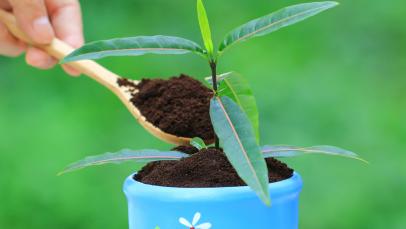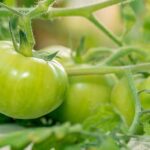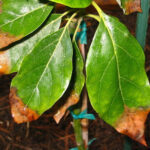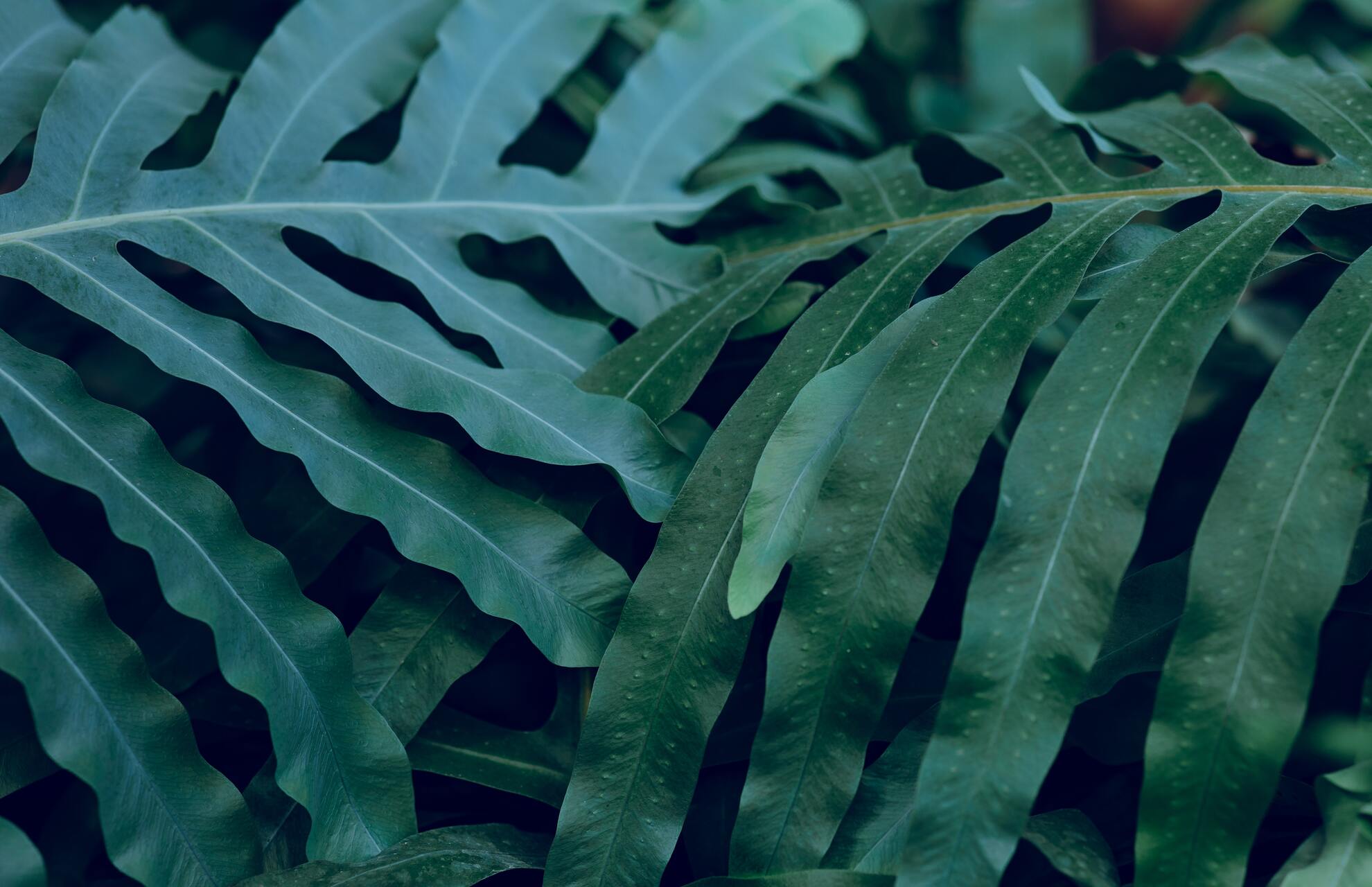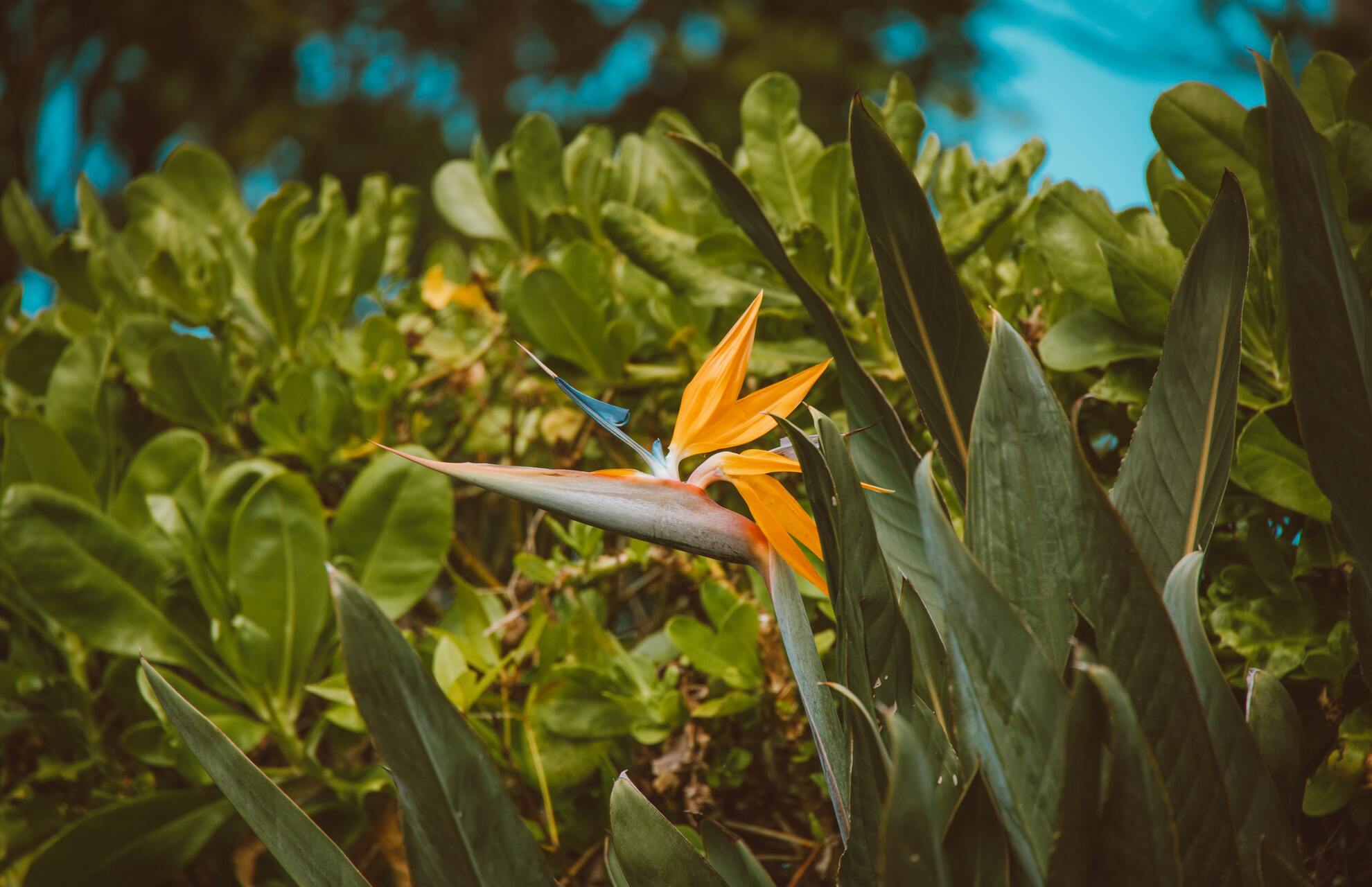You may wonder whether coffee grounds are good or not for tomato plants. The simple answer is that dumping coffee grounds straight onto your tomato plants in the garden is ineffective and, in some situations, harmful. There will be lots of articles claiming otherwise, yet this is a long-held lie! You’d be far better off composting or vermiculture the coffee grinds.
In this post, Let’s find out when coffee grounds will help your tomato plants.
- Is it Good to Use Coffee Grounds For Tomato Plants?
- Why Use Coffee Grounds For Tomato Plants?
- Benefits Of Adding Coffee Grounds To Tomato Plants
- Coffee Grounds In Compost Pile
- How to Apply Coffee Grounds As a Tomato Plant Fertilizer?
- How To Use Coffee Grounds For Tomato Plants?
- How Often Should Coffee Grounds Be Applied To Tomato Plants?
- What Plants Dislike Coffee Grounds?
- Conclusion
Is it Good to Use Coffee Grounds For Tomato Plants?
The nitrogen-rich proteins found in coffee grounds are crucial for seed germination.
Used coffee grounds, according to many gardeners, are beneficial for acid-loving plants like tomatoes. Tomatoes don’t react well to coffee grounds, some claim.
Some of these assertions are supported by relevant articles, while others are not. Let’s learn more about how effective using coffee grounds in your tomato garden is.
Why Use Coffee Grounds For Tomato Plants?
The main justification for this theory is that tomato plants do best in soil that is just a little bit acidic, which is why coffee grounds are thought to be a good fertilizer for tomato plants. When used as fertilizer, used coffee grounds can assist soil in becoming slightly more acidic.
We do mean slightly more acidic when we say that now.
In some cases, coffee grounds may actually be alkaline or neutral, which means they are not acidic and do not benefit plants. However, most of the time, the grounds are only slightly acidic enough to benefit the soil.
Nitrogen, phosphorus, and potassium, all of which are crucial for the development of tomato plants, are present in coffee grounds in amounts ranging from 2% to varying amounts.
You can provide the nutrients that tomato plants require to thrive by adding some coffee grounds to the soil beneath your tomato plants.
Coffee grounds do not function as conventional fertilizer, though, and it will take some time before they have a significant enough impact on the soil to benefit plants. In fact, it might have the opposite effect on the soil for a few weeks before releasing enough nutrients to be helpful.
Because of this, some people assert that while coffee grounds may help tomato plants in the long run, they may not necessarily do so in the early stages of growth. So, if you’re looking for something to help your plants grow quickly, keep that in mind.
Benefits Of Adding Coffee Grounds To Tomato Plants
Coffee Grounds Give Nitrogen Boost To Tomatoes
This is the most prevalent assertion, and it has two variations. Coffee Ground is either advised for use as a nitrogen-rich fertilizer or is thought to help your tomato plants flourish.
This assertion has some truth, although with considerable embellishment. Coffee grounds provide around 2% nitrogen and varying levels of phosphate and potassium, which are essential nutrients for tomato plant development. These nutrients will be released into the soil when the grounds decompose, making them available to the tomato plant.
When coffee grounds are applied to the soil, they should act as a slow-release fertilizer. They will not supply immediate nutrients to your plant, but as they degrade, they will enhance the nutritional levels in the soil.
However, if you plan on replacing your usual fertilizing practice with heaps of coffee grinds, you should reconsider your strategy.
Ordinary slow-release fertilizers meant to boost plant development contain far more nutrients than the meager 2% found in coffee grounds.
The impact of coffee grounds on tomato plant growth has also yet to be demonstrated scientifically. When compared to other organic fertilizers, they may provide a minor boost of nutrients to tomato plants in the long term, but the concentration of those nutrients is unlikely to have a visible effect on the tomato plants.
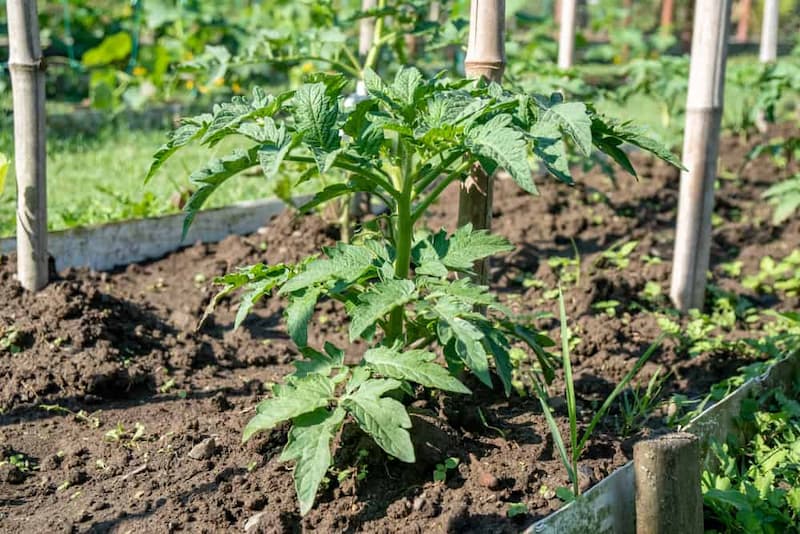
There’s no danger in putting this assertion to the test for yourself. If you’re having issues with growth or vitamin deficits, though, don’t turn to the coffee grounds for help.
Coffee Grounds To Lower pH Of The Soil
The second allegation is that coffee grounds reduce soil pH, making it more acidic. Tomato plants thrive in slightly acidic soil, therefore it stands to reason that coffee grounds are beneficial to tomato plant health. Although tomatoes like acidic soil, it appears that coffee grounds are not the method to get there.
Coffee grounds have a pH of about 6.5, which is slightly below neutral. However, this figure is inconsistent. Some studies show pH values lower than that, while others record levels significantly higher, indicating that they are genuinely alkaline.
But it isn’t the only issue here. The impacts of the grounds on the soil are likewise unknown. Even if the grounds are acidic, there is no consistent evidence that adding them to soil has the intended effect on the pH level.
There are gardening products that can efficiently reduce the soil pH in your garden, but all items must be used with caution and in accordance with the manufacturer’s recommendations. If you suspect a soil problem, always do a soil test to establish the cause before correcting the soil pH, since this might harm your tomato plants.
Coffee Grounds As A Mulch
Many organic waste items, such as dried leaves, straw, and even grass clippings, perform well as tomato mulch. There are no coffee grounds on that list.
On paper, they appear to be excellent mulch: fine-textured, organic, and gradual decomposition that releases nutrients and improves soil structure. However, they have certain unfavorable side effects in practice.
You’ll need a thick layer of mulch — at least an inch or two – to reap all of the advantages. It’s difficult enough to save enough coffee grounds to produce a thick layer of mulch, but when you put it around your tomato plants, it compacts and forms a hard layer above the soil.
This, rather than conserving rainwater, stops moisture from reaching the soil. It also prevents air from entering the soil, robbing the roots of oxygen and effectively smothering them.
Despite these drawbacks, coffee grounds are still an excellent soil amendment — just not in sufficient quantities to produce a suitable mulch.
Instead, apply a small coating of coffee grounds to the soil before applying a deeper layer of another organic mulch, or mix the coffee grounds into the mulch before applying it. You get all of the benefits of coffee grinds in your garden without any of the drawbacks.
Coffee Grounds To Manage Weeds
Coffee grinds, like mulch, are frequently advised as a weed-prevention technique. And, like with the mulch argument, it is not entirely accurate.
To properly reduce weeds, a thick layer of mulch is required, which, as previously said, is not beneficial for your plants.
The argument is also based on the assumption that coffee grounds can prevent various seeds, particularly weeds, from germinating. Although research has proven that this is true for some weeds, such as clovers, the impacts on a variety of weed seeds remain unknown.
The quantity required to control weeds, either to impede germination or as a mulch, is likewise unknown. You’re better off utilizing approved weed-control measures and just removing weeds as they appear.
Coffee Grounds To Deter Slugs And Snails
Slugs are a very prevalent pest in tomato plants. This has resulted in the recommendation of a multitude of cures, each of which has been pronounced effective in the battle against slugs and snails.

We’ve already covered this issue with respect to eggshells, refuting the myth that shattered eggshells kill slugs. It’s time to bust the myth about slugs and coffee grounds.
This assertion is based on coffee’s caffeine content. High caffeine doses do kill slugs, according to a study.
The study applied concentrated caffeine to the plants’ leaves and soil and found that it did indeed kill slugs. Because coffee includes caffeine, this has been extended to infer that coffee grounds will also kill slugs.
However, coffee grounds contain so little caffeine that it is unlikely to have any impact on slugs or snails in tomato plants.
The caffeine concentration utilized in the test that had no impact on the snails – 0.01 percent – is nevertheless larger than the caffeine content in your coffee grounds.
In other words, if you have a snail problem, you’ll have to look for a solution outside of your coffee cup.
Coffee Grounds To Prevent Infections
Every tomato plant grower wants to stay away from fungal disease. Serious cases, such as Fusarium wilt, mark the end of your tomato garden because there is no cure.
Coffee grinds are frequently recommended as a cure for preventing the epidemic of fungal infections in tomato plants.
Several research has looked at the impact of coffee on soil fungus activity. Caffeine has been associated with the inhibition of different fungal strains, according to several studies, such as this one. However, the same problem reappears: the caffeine concentration needs to be far greater than what coffee grounds provide — in this example, 0.1 percent.
Other research, like this one, shows that soil amendments (including coffee grounds) promote microbial activity, inhibiting fungal infections. However, because this study only looked at the Fusarium wilt of spinach, its impact and interactions with other fungal infections remain unclear.
This claim may have some validity, but the evidence is inconclusive. While adding some coffee grounds to your soil mix before planting is unlikely to do harm, don’t expect it to prevent or eliminate any fungal infections that may be present in your tomato plants.
Coffee Grounds In Compost Pile
The most common claim concerns the benefits of adding coffee grounds to compost. And, unlike the other claims, this one is completely true!
A good compost pile requires a carbon-to-nitrogen ratio to break down effectively and feed your plants with the nutrients they require. Coffee grinds are an important component of the ‘green materials’ list (those high in nitrogen).
It is best to add approximately 20% coffee grinds to your compost mix since anything above 30% has been reported to hinder decomposition.
Save your coffee grounds to add to your compost pile instead of wasting them on a gardening myth that doesn’t work. You can be sure that your efforts will yield results, and you won’t have to worry about any unpleasant side effects on tomato plants.
How to Apply Coffee Grounds As a Tomato Plant Fertilizer?
Coffee grounds can be added to the soil in three different ways: directly, mixed with a 1-2 inch layer of mulch, or composted first and then added as 1-2 inch layers of finished compost. If you use too many coffee grounds, they may compact, which prevents air and water from reaching the soil. Mold may also flourish there.

Used coffee grounds can be applied in three different ways to tomato plants as a fertilizer or soil amendment:
- Apply it directly to the soil
- Mix with mulch
- Compost it
The most important rule is: don’t let the coffee grounds (or compost) touch the tomato plant directly. Mulch is the same way. You should leave at least a 2-inch clearance from the steam and any lower leaves.
This is due to the possibility of mold introduction and chemical burning of the plant caused by compost and coffee grounds’ high nutrient levels.
However, the exact method you should use to apply coffee grounds to your tomato plant comes down to how many coffee grounds you’re using.
How To Use Coffee Grounds For Tomato Plants?
The number of coffee grounds you use in the compost pile can range up to 20% by volume, after which you can add it to the tomato plants. The thin layer of coffee grounds could also be used as mulch.
To benefit themselves economically and environmentally, many gardeners use coffee grounds for tomato plants. The compost mixture should include coffee grounds, which you should then use for tomato plants, in my opinion.
Furthermore, I advise against adding more than 20% by volume of coffee grounds to the compost pile. Coffee grounds should ideally be cooled before being added to the compost pile to prevent the killing of beneficial microbes.
As a thin layer of mulch, they might also be useful. However, do not lay them heavily as this could prevent the exchange of air and water. To support other hypotheses and reach any conclusions, more scientific studies are necessary.
How Often Should Coffee Grounds Be Applied To Tomato Plants?
Instead, you ought to consistently add coffee grinds to your topsoil; the frequency and volume of these additions ought to be determined by the size of your garden. If you have a big pot and are growing two or three tomato plants in it, you should add roughly one and a half to two scoops worth of ground coffee every week to give you an idea of how much to add.
Although adding used coffee grounds to the soil around your tomato plants won’t harm them, you shouldn’t anticipate that it will be very beneficial to them either. You can add them to your soil to enrich it in the early spring (to give them time to decompose), but if you plan to plant in the summer, I would not advise skipping fertilization.
Read more:
What Plants Dislike Coffee Grounds?
The grinds are frequently too acidic to apply directly to the soil, even for acid-loving plants like blueberries, azaleas, and hollies. In most circumstances, this is the case. Some plants, including geranium, asparagus fern, Chinese mustard, and Italian ryegrass, can have their growth stifled by the use of used coffee grounds.
Conclusion
There are many misconceptions in the gardening industry, and they are especially prevalent when it comes to coffee grounds, eggshells, and Epsom salt. I hope you found this information helpful in understanding how to use coffee grinds in your garden. When in doubt, composting is always the best option. It is a guaranteed method to turn what would otherwise be rubbish into a nutrient-rich treasure. Happy gardening!
Read More: 10 Best Tomatoes For Sauce: Have A Try

